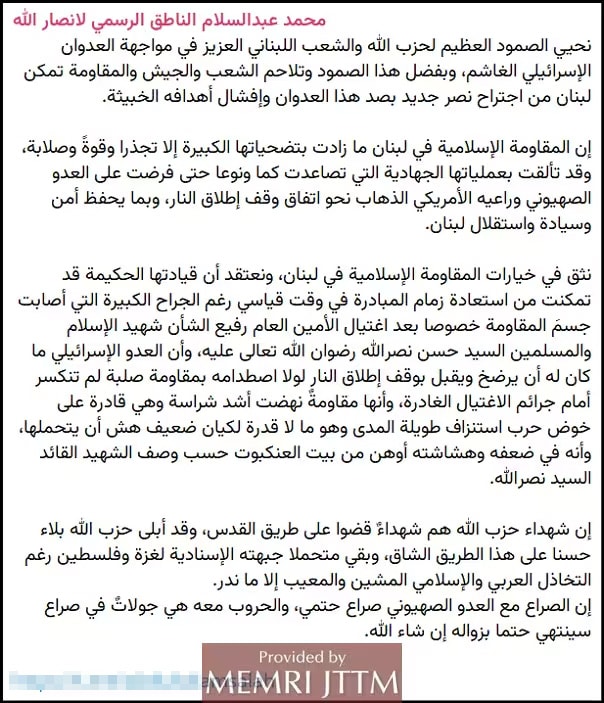The following report is now a complimentary offering from MEMRI's Jihad and Terrorism Threat Monitor (JTTM). For JTTM subscription information, click here.
On November 27, 2024 at 4 a.m. Israel time, an American-brokered ceasefire went into effect between Israel and Lebanon. U.S. President Joe Biden announced the ceasefire and praised the leaders of both sides for their ''courageous decision to end the violence.''[1]
Several Iran-backed factions from its ''axis of resistance'' congratulated Hizbullah for its ''victory'' and praised its ''steadfastness,'' which they claimed was responsible for compelling Israel to agree to the ceasefire. They asserted that the struggle against Israel is ''unavoidable'' and that the rounds of fighting will only end when Israel is wiped off the map. They also vowed to continue to support Hizbullah and the Palestinian people ''until victory.'' The factions added that the U.S. must pay a price for its participation in ''crimes'' committed by Israel. Stating that new elements will join ''the sacred struggle against the enemies of Allah,'' the factions declared that Hizbullah’s exit from the fighting would not harm the ''unity of the arenas.'' It is notable that as of this writing, Hizbullah has not issued an official response to the ceasefire.
The following is a review of the statements pertaining to the November 27, 2024 ceasefire between Israel and Lebanon that were issued by the Iran-backed factions:
Muhammad Abd Al-Salam, the spokesman for Yemen's Iran-backed Ansar Allah movement (the Houthis), shared a post on his Telegram channel praising ''the tremendous steadfastness'' of Hizbullah and the Lebanese people, thanks to which, he claimed, Lebanon was able to defeat Israel and thwart its ''perverted goals.'' He stated that the many sacrifices Hizbullah made served to strengthen it, and that it was the jihadi operations that it carried out that compelled Israel and ''its sponsor, the U.S.'' to accept the ceasefire under circumstances that preserve Lebanon’s security, its sovereignty, and its independence.
In his post, Abd Al-Salam praised the Hizbullah leadership for reclaiming the initiative ''in record time,'' despite the harsh blows absorbed by the organization, including the elimination of its slain leader, ''the martyr of Islam and the Muslims,'' Hassan Nasrallah. The spokesman claimed that Hizbullah is capable of waging a long-term war of attrition against Israel, which ''a weak and fragile entity [i.e. Israel] cannot endure.'' He also wrote that Hizbullah bore the burden of assistance to the Palestinians despite ''the shameful abandonment'' by the Arab and Islamic world. In conclusion, Abd Al-Salam wrote that ''the struggle against the Zionist enemy is unavoidable, and the wars against it are the rounds in a conflict that will inevitably end with its disappearance.''[2]

The Iran-backed Iraqi Hizbullah Brigades militia posted an official statement on its Telegram channel in which it declared that the ceasefire in Lebanon was a ''momentous Lebanese decision'' which could not have been attained without the ''steadfastness of the Hizbullah fighters and the inability of the Zionists to achieve their goals.'' The organization added that the U.S. is a partner in Israel’s ''crimes'' and that it must ''pay the price for this, sooner or later.'' It wrote that ''a rest on the part of one of the sides of the axis of resistance would not affect the unity of the arenas. New sides will join and strengthen the arena of the sacred struggle against the enemies of Allah, His Messenger and the believers.'' The militia reiterated its support for the Palestinian issue and declared, ''We will not abandon our people in Gaza, whatever the sacrifices may be.''[3]

On his Telegram channel, Palestinian Islamic Jihad (PIJ) Secretary-General Ziyad Al-Nakhala posted a message of congratulations to Hizbullah and its leader, Na’im Qassem, in which he also praised the organization’s steadfastness, ''despite the wounds and the enemies' onslaught, led by the U.S. and its allies.'' He lauded Hizbullah’s mobilization alongside ''its brothers'' the Palestinians, ''at a time when others were unable to provide even a sip of water to the thirsty and the hungry'' in Gaza. He also expressed great praise for the sacrifices made by Hizbullah ''in defense of the religion, the honor, and the homeland.'' He declared: ''We will stand with you as one man and one resistance until victory,'' and quoted Nasrallah, ''We are not defeated. Either we win, or we win.''[4]

[1] Whitehouse.gov, November 27, 2024.
[2] Telegram, November 27, 2024.
[3] Telegram, November 27, 2024.
[4] Telegram, November 27, 2024.
The full text of this post is available to subscribers.
Please login or register to request subscription information from MEMRI









